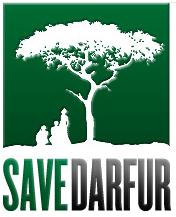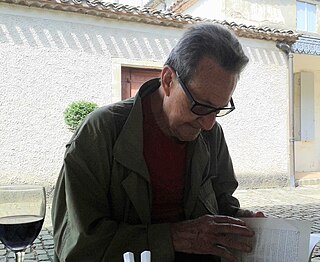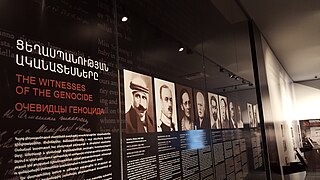
Darfur is a region of western Sudan. Dār is an Arabic word meaning "home [of]" – the region was named Dardaju while ruled by the Daju, who migrated from Meroë c. 350 AD, and it was renamed Dartunjur when the Tunjur ruled the area. Darfur was an independent sultanate for several hundred years until 1874, when it fell to the Sudanese warlord Rabih az-Zubayr. The region was later invaded and incorporated into Sudan by Anglo-Egyptian forces in 1916. As an administrative region, Darfur is divided into five federal states: Central Darfur, East Darfur, North Darfur, South Darfur and West Darfur. Because of the War in Darfur between Sudanese government forces and the indigenous population, the region has been in a state of humanitarian emergency and genocide since 2003. The factors include religious and ethnic rivalry, and the rivalry between farmers and herders.

The International Association of Genocide Scholars (IAGS) is an international non-partisan organization that seeks to further research and teaching about the nature, causes, and consequences of genocide, including the Armenian genocide, the Holocaust, the genocides in Cambodia, Rwanda, Burundi, Bosnia-Herzogovina, Bangladesh, Sudan, and other nations. The IAGS also advances policy studies on the prevention of genocide. The association's members consider comparative research, case studies, links between genocide and other human rights violations, predictive models for prevention of genocide, and tribunals and courts for the punishment of genocide. The organization's membership includes academics, anti-genocide activists, artists, genocide survivors, journalists, jurists, and public policy makers. Membership is open to interested persons worldwide.
Leo Kuper was a South African sociologist specialising in the study of genocide.

The Save Darfur Coalition was an advocacy group that attempted "to raise public awareness and mobilize a massive response to the atrocities in Sudan's western region of Darfur." Headquartered in Washington, D.C., it was a coalition of more than 190 religious, political, and human rights organizations organized to campaign for a response to the atrocities of the War in Darfur, which culminated in a humanitarian crisis. By 2013, reports indicated that the conflict had claimed approximately 300,000 lives and had displaced over 2.5 million people.

This is the bibliography and reference section for the Darfur conflict series. External links to reports, news articles and other sources of information may also be found below.

Throughout its history, Darfur has been the home to several cultures and kingdoms, such as the Daju and Tunjur kingdoms. The recorded history of Darfur begins in the seventeenth century, with the foundation of the Fur Sultanate by the Keira dynasty. The Sultanate of Darfur was initially destroyed in 1874 by the Khedivate of Egypt. In 1899, the government of Anglo-Egyptian Sudan recognized Ali Dinar as the Sultan of Darfur, in exchange for an annual tribute of 500 pound sterling. This lasted until Darfur was formally annexed in 1916. The region remained underdeveloped through the period of colonial rule and after independence in 1956. The majority of national resources were directed toward the riverine Arabs clustered along the Nile near Khartoum. This pattern of structural inequality and overly underdevelopment resulted in increasing restiveness among Darfuris. The influence of regional geopolitics and war by proxy, coupled with economic hardship and environmental degradation, from soon after independence led to sporadic armed resistance from the mid-1980s. The continued violence culminated in an armed resistance movement around 2003.
The Aegis Trust, founded in 2000, is the British NGO which campaigns to prevent genocide worldwide. Based at the United Kingdom's Holocaust Centre, which opened in 1995, the Aegis Trust coordinates the UK Genocide Prevention All-Party Parliamentary Group, funds the Genocide Prevention Group (Canada) and is responsible for the Kigali Genocide Memorial Centre in Rwanda, which commemorates the 1994 genocide and is central to education of a new generation about the dangers of ethnic division.
The Daju people are a group of seven distinct ethnicities speaking related languages living on both sides of the Chad-Sudan border and in the Nuba Mountains. Separated by distance and speaking different languages, at present, they generally have little cultural affinity to each other.

René Lemarchand is a French-American political scientist who is known for his research on ethnic conflict and genocide in Rwanda, Burundi and Darfur. Publishing in both English and French, he is particularly known for his work on the concept of clientelism. He is a Professor Emeritus at the University of Florida, and continues to write, teach internationally and consult. Since retiring he has worked for USAID out of Abidjan, Côte d'Ivoire as a Regional Consultant for West Africa in Governance and Democracy, and as Democracy and Governance advisor to USAID / Ghana.

Israel W. Charny is an Israeli psychologist and genocide scholar. He is the editor of two-volume Encyclopedia of Genocide, and executive director of the Institute on the Holocaust and Genocide in Jerusalem.
Eric Markusen was Professor of Sociology and Social Work at Southwest Minnesota State University in Marshall, Minnesota, USA, and Research Director of the Danish Center for Holocaust and Genocide Studies in Copenhagen. He also served as Associate Editor of the two-volume Encyclopedia of Genocide, published in 1999.
Heath Ward Lowry is the Atatürk Professor of Ottoman and Modern Turkish Studies emeritus at Princeton University and Bahçeşehir University. He is an author of books about the history of the Ottoman Empire and Modern Turkey.
The institute on the Holocaust and Genocide was founded in Jerusalem, in 1979, by Israeli scholars Israel W. Charny, Shamai Davidson and Nobel Laureate Elie Wiesel.

Witnesses and testimony provide an important and valuable insight into the events which occurred both during and after the Armenian genocide. The Armenian genocide was prepared and carried out by the Ottoman government in 1915 as well as in the following years. As a result of the genocide, as many as 1.5 million Armenians who were living in their ancestral homeland were deported and murdered.

Utilitarian genocide is one of five forms of genocide categorized and defined in 1975 by genocide scholar Vahakn Dadrian. Utilitarian genocide is distinctly different from ideologically motivated genocides like the Holocaust and the Cambodian genocide. This form of genocide has as its aim some form of material gain, such as the seizure of territory in order to gain control of economic resources for commercial exploitation. Two given examples of this form are the genocide of indigenous peoples in Brazil and the genocide of indigenous peoples in Paraguay.
Throughout the ongoing Darfur genocide in the Darfur war there has been a systematic campaign of rape, which has been used as a weapon of war, in the ethnic cleansing of black Africans from the region. The majority of rapes have been carried out by the Sudanese government forces and the Janjaweed paramilitary groups. The actions of the Janjaweed have been described as genocidal rape, with not just women, but children also being raped, as well as babies being bludgeoned to death and the sexual mutilation of victims being commonplace.
The following lists events that happened during 1915 in the Ottoman Empire.

The Darfur genocide was the systematic killing of ethnic Darfuri people during the War in Darfur. The genocide, which was carried out against the Fur, Masalit and Zaghawa ethnic groups, led the International Criminal Court (ICC) to indict several people for crimes against humanity, rape, forced transfer and torture. An estimated 200,000 people were killed between 2003 and 2005.
Century of genocide may refer to:
This is a select annotated bibliography of scholarly English language books and journal articles about the subject of genocide studies; for bibliographies of genocidal acts or events, please see the See also section for individual articles. A brief selection of English translations of primary sources is included for items related to the development of genocide studies. Book entries may have references to journal articles and reviews as annotations. Additional bibliographies can be found in many of the book-length works listed below; see Further Reading for several book and chapter-length bibliographies. The External links section contains entries for publicly available materials on the development of genocide studies.









